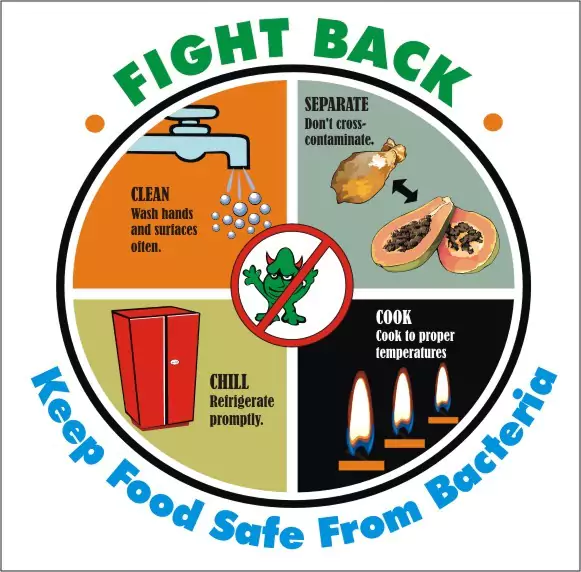 Physical health is a valuable but easily spent resource. Not speaking of serious chronic diseases, there are a lot of minor, less noticeable threats that can nevertheless affect one’s physical condition and productivity: the common cold, headaches, and nausea are among them. However, among these minor threats, the most distressing one is perhaps food poisoning, which can easily incapacitate a person for at least several days.
Physical health is a valuable but easily spent resource. Not speaking of serious chronic diseases, there are a lot of minor, less noticeable threats that can nevertheless affect one’s physical condition and productivity: the common cold, headaches, and nausea are among them. However, among these minor threats, the most distressing one is perhaps food poisoning, which can easily incapacitate a person for at least several days.

✅ AI Essay Writer ✅ AI Detector ✅ Plagchecker ✅ Paraphraser
✅ Summarizer ✅ Citation Generator
A person usually gets food poisoning as a result of consuming contaminated or spoiled food and drinks. It often happens at picnics, in school cafeterias, restaurants, and other similar places. There are different ways food can get contaminated. For example, meat can become contaminated by contacting the intestines of an animal being processed; water can contact animal or human waste and become infected as well. Generally, contamination occurs when food is improperly processed or stored. Other ways of contamination include dirty hands, improperly-cleaned cooking utensils, an expired expiry date, and so on. Besides, a person can get food poisoning when consuming raw or under-cooked products—fruit, vegetables, fish, eggs, or meat (Medline Plus).
Generally speaking, food poisoning is an intoxication caused by low-quality food. However, a more meticulous scrutiny reveals that food poisoning has a lot to do with malicious bacterium; commonly, these bacterium comprise Campylobacter, Salmonella, Shigella, Listeria, and some others. Although they are, in general, not life-threatening, in rare cases there can be serious complications caused by the exposure to these bacterium, such as reactive arthritis or brain/nerve problems (Web MD).
Symptoms of food poisoning include fever, nausea, diarrhea, vomiting, general weakness, and strong abdominal pain or cramps. Usually, the symptoms start within the first several hours after contamination, but in some cases, food poisoning symptoms can remain hidden for days or even weeks. The sickness usually lasts up to three days; in the majority of cases, one can treat the sickness themselves: usually it is enough to adhere to a special diet (often it is is recommended to eat boiled rice, and drink a lot of strong tea or plain water) and take charcoal pills. However, there might be cases when it is crucial that a person with food poisoning visits a doctor. The list of disturbing symptoms includes bloody vomit or stools; diarrhea for more than three days; an oral temperature higher than 101.5 F; dehydration, severe weakness, and neurological symptoms such as blurry vision or tingling (Mayo Clinic).
Food poisoning is a common but distressing digestion disorder usually caused by the consumption of contaminated food. In order to minimize the risks of developing the symptoms, which include nausea, diarrhea, weakness, fever, and some other manifestations, one should avoid eating raw or under-cooked food, wash hands before meals, and always check the expiry date on a product package. Food poisoning is easy to treat, but there are cases when it is better to seek medical aid; these cases include having blood in one’s vomit or stool, dehydration, high oral temperature, and neurological symptoms.
References
“Food Poisoning: Causes, Symptoms, Treatments, Recovery.” WebMD. WebMD, n.d. Web. 12 Oct. 2015. <http://www.webmd.com/food-recipes/food-poisoning/food-poisoning>
“Food Poisoning.” Mayo Clinic. N.p., n.d. Web. 12 Oct. 2015. <http://www.mayoclinic.org/diseases-conditions/food-poisoning/basics/symptoms/con-20031705>
“Food Poisoning.” Medline Plus. U.S. National Library of Medicine, n.d. Web. 12 Oct. 2015. <https://www.nlm.nih.gov/medlineplus/ency/article/001652.htm>
Follow us on Reddit for more insights and updates.





Comments (0)
Welcome to A*Help comments!
We’re all about debate and discussion at A*Help.
We value the diverse opinions of users, so you may find points of view that you don’t agree with. And that’s cool. However, there are certain things we’re not OK with: attempts to manipulate our data in any way, for example, or the posting of discriminative, offensive, hateful, or disparaging material.